Breaking news:
June 17, 2024: THE AMERICAN ASSOCIATION OF UNIVERSITY PROFESSORS VOTES FOR FOSSIL FUEL DIVESTMENT
(Washington, DC) Delegates at the June 15 meeting of the influential American Association of University Professors (AAUP) overwhelmingly voted to approve a sweeping proposal demanding that TIAA, Vanguard, Fidelity, and state pension boards divest fossil fuels from their funds. This vote throws the moral weight and intellectual analysis of the country’s university and college faculty behind fossil fuel divestment. Their goal is to help put the brakes on climate change.
The proposal passed with only a single opposing vote out of 100 delegates present. Now it goes to the AAUP executive committee for ratification and to direct its implementation.
“The great minds in America’s universities are profoundly responsible for our understanding of the climate threat; it is fitting that their colleagues are doing their part to help prevent this great catastrophe before it wrecks the lives of the students we educate.”
Bill McKibben
Schumann Distinguished Scholar in Environmental Studies,
Middlebury College, June 15, 2024
Support for the proposal signals a further US cultural shift toward fossil fuel divestment, and points to a disconnect between institutions that continue to invest in fossil fuels and influential stakeholders who see fossil fuels as the cause of unfolding climate change.
For its part, TIAA has some $1.3 trillion of retirement funds under its management from five million university professors, teachers, nonprofit workers, and staff. It holds at least $78 billion in fossil fuels assets and remains among the top five coal bond-holders in the world.
Said Daniel Segal, a history and anthropology professor emeritus at Pitzer College who is among those spearheading the proposal, “The landslide democratic vote at the AAUP national meeting conveys the collective and clarion voice of higher education faculty: Get planet-destroying fossil fuels out of our retirement funds! We owe our students, and all young people, a liveable planet.”
The proposal will also pressure pension funds to divest. Just 23 investors hold 50% of all institutional investments in fossil fuel companies. Meanwhile, the economic case for fossil fuel investments continues to unravel.
Read: “Your pension, your future, and your students’ future,” an Academe blog post, by Don Nonini, Sheldon Pollock, and Dan Segal.
An excerpt from the proposal (the full proposal, which is short, is here):
BE IT RESOLVED, that the Association, in consultation with AAUP chapters, will urge state pension boards, college and university committees and administrators managing the retirement funds of its members, and the boards of Vanguard, Fidelity, and TIAA, and the AAUP Foundation to:
- enact an immediate moratorium on all new direct investments in fossil fuels, including extraction and processing, pipelines, and power plants;
- develop and execute a prudent plan to divest fully and without delay from all current coal, oil, and gas investments for corporations or other entities that extract, transport, trade or otherwise contribute to the production of coal, oil and gas;
- reinvest funds in renewable energy projects, especially those that benefit displaced workers and frontline communities; and
BE IT RESOLVED, that the Association will divest all fossil fuel investments in AAUP 501(c)(6) accounts.
February 28, 2024: Grist article Who’s behind the destruction of Brazil’s Cerrado? highlights TIAA’s role in destruction of critical ecosystem.
On Feb 28, Grist published an article by Sarah Sax and Mauricio Angelo called “Who’s Behind the Destruction of Brazil’s Cerrado?” The authors trace the sudden global land rush that drew investors to gobble up farmland after 2007, leading to massive deforestation and monocropping.
The Cerrado, historically, has been rich in trees and shrubs with thick roots that channel water into acquifers and store billions of metric tons of carbon. Now millions of acres of this biodiverse vegetation have been replaced by sugar plantations, cattle fields, and soy. The World Wildlife Fund predicts that at current rates of deforestation, the biome will collapse in the a few years, taking crucial water sources with it. This process is the most significant contributor to Brazil’s greenhouse gas emissions.
The process by which TIAA has obtained its land in the Cerrado is itself sinister. According to Sax and Angelo, there is a great deal of land in Brazil that is in the public domain, inhabited by traditional communities and small farmers, who have a legal right to the land but often do not have official deeds. “Those seeking to claim that land — often business owners or corporations — reportedly hire armed men to intimidate and run off residents. They then clear the land of trees or native vegetation, either seeding pasture for cows or preparing it to grow crops like soy, cotton, or corn.
According to leaked documents, TIAA knew full well that they were buying deforested and stolen land from known criminals—and they went ahead anyway.
Read the full story here.
December 4, 2023: Amidst COP28, TIAA’s Fossil Fuel Investments are Devastating Children’s Health Around the World
For Press Inquiries: Kate Krauss (718) 864-6647, katiephr@gmail.com
This is Cross-Published on Common Dreams
Authors:
- Don Lieber, Campaign Director, FIRST, DO NO HARM, @docs4divestment, healthcaredivest@gmail.com
- Iris Marie Bloom, Director, Protecting our Waters, Co-organizer, TIAA-DIVEST!
- Caroline Levine, David and Kathleen Ryan Professor of the Humanities Cornell University, Co-organizer, TIAA-DIVEST!
- Amy Gray, Associate Director, Climate Finance, CLIMATE SAFE PENSIONS NETWORK & STAND.EARTH
Yesterday, health ministers and global leaders at the COP28 Climate Summit in Dubai held sessions on the dire impacts to global health and disparities caused by climate chaos and fossil fuels, and the urgent need to phase out fossil fuels as an urgent global health imperative.
Yet the Teachers Insurance and Annuity Association of America (TIAA) invests a shockingly high proportion of its assets under management in fossil fuels. As teachers, health professionals, and plan participants, we are horrified by this and demand that TIAA end these toxic and immoral investments.
Health experts have long been alarmed by coal’s deadly impact on human health worldwide; a new report details that it is even deadlier than previously thought: production alone killed 460,000 people in the U.S. in the past 20 years. Thousands are still dying each year, directly from coal production.
TIAA is a major investor in coal. TIAA is the world’s largest coal bond investor in the biggest coal producer on Earth, Adani; overall, it’s the fourth largest investor in coal bonds on the planet.
TIAA holds a staggering $78 billion in oil and gas investments. This includes direct holdings in the world’s largest and dirtiest fossil fuel producers like ExxonMobil and TotalEnergies. TIAA is the second largest investor in fossil fuel bonds on the planet.
These investments have horrific global health implications, and cause direct harm to millions of the world’s most vulnerable people, particularly children in the Global South.
In Delhi, the world’s second most populous city, one in three children have asthma and airway obstruction attributed to fossil fuel PM2 exposure, described as “like breathing poison.”
Just a few subway stops from TIAA’s 3rd Avenue headquarters in Manhattan, where executives amass millions in annual compensation, children in the Bronx suffer some of the highest asthma rates in North America.
Across the U.S., from inner city Los Angeles to Gulf Coast Louisiana to rural Pennsylvania, children in marginalized communities suffer disproportionate health impacts from fossil fuel exposure with lifetime implications: respiratory conditions, neurological disorders, neonatal complications and even pediatric cancers are all linked directly to fossil fuels via direct exposure or residential proximity to production sites.
The global harm to human health from fossil fuels is staggering: one in five preventable deaths is caused by fossil fuel air pollution, according to Harvard researchers.
As world governments gather for COP28, we demand that TIAA:
- Establish a fossil fuel exclusion policy for all future investing, effective immediately.
- Dump all deadly coal bonds immediately.
- Establish a rapid timeline to phase out all existing holdings connected with fossil fuels, in alignment with established global reduction targets.
TIAA’s massive fossil fuel investments provide the finance which enables huge capital-intensive oil and gas pipelines and drilling projects now underway across Africa, Asia, and North and South America. This ensures catastrophic additional greenhouse gas emissions into the future, while exacerbating existing global health disparities, poisoning local air, water and soil, and displacing thousands.
We reject any concept of “fiduciary responsibility” which ignores fossil fuel investments’ violations of global health and climate justice.
From Delhi to Detroit, the most vulnerable people bear the brunt of fossil-fueled climate chaos including worsening fires, floods, smoke, toxic air, and deadly heat.
TIAA’s marketing slogan is “Invest in Your Legacy”—but the only legacy derived from billions in fossil fuel investments is climate chaos, environmental destruction, disease, and death.
In October, the National Academy of Medicine — the most revered medical organization in the US — announced its commitment to divest from fossil fuels, joining nearly 1600 institutions around the world. The teachers, physicians, and nurses urge TIAA to stop ignoring global health experts; hundreds of thousands of TIAA clients have already spoken out.
It’s our money, and it’s past time TIAA divest from fossil fuels.
December 2022: TIAA, World’s 5th Largest Holder of Coal Bonds, Evades Climate Accountability After Complaint by 800 Academic Clients
PRI accountability mechanism fails, enables greenwashing by trillion dollar pension fund
December 12, 2022 New York – The Board of the UN-supported Principles for Responsible Investment (PRI) confirmed its decision to dismiss a complaint filed against the $1.2 trillion pension fund Teachers Insurance & Annuity Association (TIAA) by nearly 800 TIAA clients—faculty from a wide range of fields including climate science and medicine. The PRI’s refusal to act effectively enables TIAA to continue to “climate-wash,” through its status as a Signatory to the PRI, its $78 billion in fossil fuel investments and substantial land holdings linked to deforestation and human rights violations. TIAA’s bond investments include the notorious Adani Group, which is now developing more new thermal coal mining capacity than any other private company. TIAA is the world’s 5th largest holder of coal bonds and the world’s 8th largest holder of oil and gas bonds, among its many fossil fuel investments.
The PRI’s hands-off approach to TIAA’s egregious investments and systematic climate greenwashing marks the end of the PRI’s relevance as a symbol of responsible, climate-safe investment, unless stronger criteria and accountability processes are established for its membership.
The complaint, filed on October 19th against TIAA’s principal asset manager and wholly owned subsidiary Nuveen, a PRI signatory, documents how the firm has systematically violated each of the PRI’s six principles through its climate-harming investment practices, and called for its delisting if the problems are unaddressed. The complaint details TIAA’s $9.1 billion in coal industry bonds and investment practices that are clearly incompatible with a 1.5ºC aligned net zero pathway; systematic disregard for land rights and livelihoods in its investments in Brazilian soy farms; mislabeling of fossil fuel-laden funds as “sustainable”; and persistent greenwashing.
In an email to the complainants dated December 9th, PRI wrote “The PRI Board reviewed a complaint about Nuveen and Nuveen’s full response and decided that the allegations do not constitute a breach of the policy. As such, there is no reason to change Nuveen’s status as a PRI signatory.” PRI further stated, “Signatories ultimately choose how they go about implementing the Principles, in-line with their own investment beliefs, investor duties, commitments, and policies.” PRI declined complainants’ request to publish Nuveen’s response.
Caroline Levine, Ryan Professor of the Humanities at Cornell University and a TIAA-Divest coordinating committee member, said “Today, the PRI’s formal response to the complaint gives the green light to irresponsible investors like TIAA, who can make themselves look good by signing onto the Principles for Responsible Investment and then do exactly as they please, including pouring money into the likes of Adani, Exxon, Chevron, and Halliburton.”
Bill McKibben, author, climate expert, Schumann Distinguished Scholar at Middlebury College, TIAA client and complaint signatory, commented: “TIAA is going to be very sorry that PRI didn’t take action and save it from itself. Clearly it’s crazy for the pensions of the very people who did the research to understand global warming to be invested in the companies that are producing this crisis. And now those pensioners–like me–will have to stand up ourselves and insist. We’re watching the daily devastation of climate change, but we’re not standing idly as we do so. We’re angry and ready to push cynical institutions like TIAA.”
Last year, TIAA committed to achieve net zero emissions by 2050 for its $300 billion General Account, one third of which the complaint found was heavily weighted with fossil fuels in the form of public corporate bonds. However, TIAA has failed to set an emissions reduction target that covers all assets under management nor to set interim goals for its General Account, and TIAA has stated it will not consider Scope 3 emissions of its investments.
Hana Heineken, Senior Attorney at the Center for International Environmental Law (CIEL), who assisted in the filing of the complaint, said “TIAA’s conduct epitomizes the net-zero greenwashing that the UN Secretary General has called a sham and a ‘toxic cover-up.’ PRI’s refusal to act on the serious allegations in this complaint, in the midst of mounting climate chaos, sends the wrong message at the wrong time. TIAA has a fiduciary duty to act in the long-term interests of its beneficiaries, and that means taking meaningful climate action.”
Supporting Quotes:
Bill Kish, Co-Founder of TIAA-Divest!, said: “Unfortunately PRI has proven itself to be little more than a greenwash-enabler. However, there are many other avenues that we can and will pursue. We are confident that TIAA will eventually come to understand that giving their customers exactly what they don’t want is a poor business model.”
Coedie McAvoy, Wangan and Jagalingou Senior Cultural Custodian, said, “The damage enabled by TIAA’s investments in the Adani Group might be abstract for the boards of TIAA/Nuveen and the UN PRI. But for Wangan and Jagalingou people the harm is very real. We’ve been on Adani’s Carmichael mining lease conducting our Waddananngu cultural ceremony for over 470 days now – breathing the dust and pollution from Adani’s coal mine and bearing witness as Adani destroys the sacred lands and waters that our ancestors cared for for millenia. TIAA’s funding of Adani makes it complicit in Adani’s violation of our human rights and its destruction of our cultural heritage. We demand that TIAA divest from all Adani Group companies and refuse any further funding to Adani until it abandons its Carmichael coal mine.”
Amy Gray, Senior Climate Finance Strategist at Stand.earth and coordinator of the Climate Safe Pensions Network, said “We cannot afford any more stalling tactics from TIAA, and fossil fuel divestment is an investment in our collective future. Frontline communities won’t wait for financial institutions to appease fossil fuel corporations while our homes burn and flood, while our bodies are polluted, and while our children’s futures are destroyed for profit. TIAA/Nuveen must heed the writing on the wall, set the standard for the industry, and stop fossil fuel financing now.”
Soul Fire Farm, one of several grassroots organizations and nonprofits that have voiced support for the complaint, added, “As an Afro-Indigenous centered community farm, we are aware of the ways TIAA’s harmful land acquisition practices impact the communities in which our work is anchored. The complaint rightly identifies that ‘In the last decade, TIAA has increased its land accumulation in Mississippi by five-fold…precisely in the region where Black Farmers have lost the largest amount of land in recent decades due to discriminatory practices.’”
Pablo Brait, Senior Campaigner, Market Forces, said: “Investing in the Adani Group is the textbook definition of irresponsible investment. Adani is worsening runaway climate change by pouring billions of dollars into new coal mines and polluting power stations. Adani Group is refusing to shrink its pipeline of climate-wrecking fossil fuel expansions while it greenwashes itself by big-noting its activities in renewable energy. If TIAA’s significant investment in the Adani Group doesn’t breach UN Principles for Responsible Investment policy, then the policy has no credibility and must be urgently updated.”
Notes to Editors:
1) Nuveen has been a member of the PRI since December 18, 2018.
2) As of December 10, 2022, 782 faculty and staff from over 200 institutions have joined the PRI complaint against TIAA/Nuveen, including Bill McKibben, Michael Mann, Judith Butler, Amitav Ghosh, Noam Chomsky, Naomi Oreskes, and Ruth Wilson Gilmore.
3) TIAA/Nuveen is one of the largest institutional investortimberland in the world. As of Dec. 31st 2021, Nuveen Natural Capital had $10.5 billion of land-based assets under management and 3 million acres across 600 properties in ten countries, including over 1 million acres in Brazil and nearly 600,000 acres in the US. Nuveen’s investments in Brazil have been linked to land-grabbing, deforestation, and the illegal use of shell companies.
4) Newly published 12/12/2022: “Land grabbers cause deforestation in traditional territories in southern Piauí where TIAA and Harvard operate in farmland markets”
5) TIAA/Nuveen’s fossil fuel investments were analyzed with the assistance of University College Dublin School of Business, using the Coal Exist List and Oil & Gas Exit List; and the Institute for Energy Economics and Financial Analysis (IEEFA) – their full analysis is available here.
6) TIAA/Nuveen’s equity funds were analyzed using the Fossil Free Funds database.
November 2022: The financial case for fossil fuel divestment is strong, yet TIAA dismissed it as a necessary building block to a meaningful climate change plan
November 16, 2022 (IEEFA)—The climate action plan issued by the Teachers Insurance and Annuity Association of America (TIAA) displays disappointing ambition and is misaligned with industry standards and appeals from its climate-aware customer base, according to a new Institute for Energy Economics and Financial Analysis (IEEFA) report, TIAA Fails Clients on Climate.
Despite the plan’s shortcomings, decisive guidance from TIAA’s board and a comprehensive climate strategy would position the company as a climate leader. IEEFA’s report is a roadmap for a sustainable and profitable way forward to a fossil free portfolio.
TIAA manages a diversified investment portfolio of $1.4 trillion on behalf of educational, cultural, health and social service professionals, a constituency that is increasingly alarmed by accelerating global climate change. The company’s climate action plan prioritizes only a small segment of its portfolio for immediate review and action.
“TIAA has promised a fully developed net-zero plan for its assets under management, but the scope it has proposed for its first round is small and lags basic industry standards that address climate change,” said Tom Sanzillo, IEEFA director of financial analysis and author of the report. “Our initial review of the numbers suggests there is significant carbon exposure in each major asset class under management.”
The principal findings of the study suggest there is much work for TIAA and its principal subsidiary Nuveen to make a credible plan to reach its net zero goals. Key findings of the report include:
- The first phase of the climate action plan covers TIAA’s $285 billion General Account. TIAA’s corporate bond portfolio and real estate holdings in the General Account are considered the priority investments slated for review and net-zero alignment. They constitute $136.5 billion and $3.4 billion of the General Account, respectively. The $140 billion constitutes 10% of the TIAA’s total $1.4 trillion assets under management, a small, unambitious priority.
- IEEFA conservatively estimates that TIAA’s enterprise-wide portfolio of $1.4 trillion contains $78 billion in fossil fuel risks. Our finding is heavily qualified due to a lack of transparency. TIAA should use the climate action plan to address the opaqueness in the future.
- TIAA’s public corporate bond portfolio is heavily weighted with fossil fuels. A review of its $136.5 billion General Account corporate bond portfolio finds 17.2% consists of fossil fuel and utility holdings.
- IEEFA estimates that approximately 12%, or $4.7 billion of the $34.1 billion General Account private equity portfolio has significant carbon exposure. TIAA’s private equity investments, currently called “other investments” and ranked a “low priority” for climate action, should be a much higher priority.
- IEEFA estimates that approximately 7% of the equity portfolio ($500 billion) is exposed to fossil fuels. The General Account’s equity holdings equal $10.1 billion, a miniscule slice of its overall equity assets. To align the General Account holdings with net-zero policies has direct and significant implications for the $500 billion overall holdings. This, too, is a “low” priority that should be higher.
The report also raises concerns with the policy orientation of TIAA. Many major financial services companies, including insurance companies like TIAA, have fossil fuel divestment or exclusion policies. Such policies are considered best practice by industry leaders and insurance regulators, who increasingly expect due consideration of fossil fuel divestment as a component of any climate action plan. TIAA’s failure to consider divestment as a mechanism to protect its portfolio is a striking lapse in its fiduciary obligations.
“TIAA has stated that climate risk is financial risk. We agree,” Sanzillo said. “But part of risk analysis is doing something about it. To foreclose the divestment option leaves TIAA very little room to achieve a net-zero portfolio. The policy approach lacks thoughtful planning, which is the foundation of investment due diligence. TIAA’s customer base is more attuned than most employee funds to the issue of climate change. A weak climate plan puts at risk the trust and confidence that its customers have placed in TIAA’s directors and management.”
The financial case for fossil fuel divestment is strong. For most of the last decade, fossil fuel stocks clustered at the bottom of the market, overproducing and following an outmoded business model that exposed them to price volatility. TIAA has a tremendous opportunity to lead with its climate action plan by promptly evaluating how to achieve its financial targets with a fossil-free portfolio.
Full Report: TIAA Fails Clients on Climate
October 2022: Trillion-dollar pension fund TIAA faces climate-washing complaint brought by hundreds of professors and scientists
New York, NY — Nearly 300 clients of the $1.2 trillion retirement giant TIAA filed a formal complaint today with the UN-sponsored Principles for Responsible Investment (PRI) initiative, alleging TIAA’s substantial investments in fossil fuels and deforestation violate TIAA’s climate pledges and commitment to the six Principles for Responsible Investment.
TIAA participants, including the academics Bill McKibben, Michael Mann, Dipesh Chakrabaty, Ruth Wilson Gilmore, and Judith Butler, are filing the complaint to highlight TIAA’s investments in the drivers of climate change, including at least $78 billion in fossil fuels, $9.1 billion of which are coal industry bonds. Such investments escalate the climate emergency while violating the commitments TIAA made to PRI through its subsidiary and asset manager, Nuveen. TIAA also invests heavily in timber and industrial agriculture linked to deforestation and illegality. Deforestation is second to fossil fuels as a driver of climate change. The complainants call on the PRI to investigate and address TIAA’s “irresponsible investments and systematic greenwashing practices.”
Bill McKibben, author, climate expert, Schumann Distinguished Scholar at Middlebury College, and TIAA client, commented: “Most of the people that this giant fund serves are teachers, members of a profession that takes intellectual honesty — and the future — seriously. Time for TIAA to do the same.”
The complainants argue that TIAA’s refusal to consider fossil fuel divestment violates its fiduciary duty because burning fossil fuels ignores the interests of its clients and harms their long-term financial well-being.
TIAA is one of the world’s largest holders of bonds across the coal value chain — ranking 5th globally — including holding over $91 million in bonds of the conglomerate Adani that owns the controversial Carmichael coal mine in Australia. TIAA/Nuveen also invests in fossil fuel companies, including Chevron, Exxon, Enbridge, TotalEnergies (building the contested East African Crude Oil Pipeline).
“When TIAA invests teachers’ money in catastrophic fossil fuels and land grabs, they fundamentally undermine the work we do to prepare students for rich, fulfilling lives,” commented Caroline Levine, Cornell University professor, and TIAA-Divest! team member.
The complainants, with the support of TIAA-Divest!, call on TIAA to establish a moratorium on new fossil fuel investments, including both shares and bonds; to divest its existing fossil fuel investments by 2025 in line with a 1.5°C pathway; and to stop land grabs leading to deforestation and human rights harms, in order to make good on the specific commitments it has made as a PRI signatory.
If TIAA/Nuveen refuses to come into compliance, the complainants are asking PRI to expel Nuveen from the PRI initiative.
Read more about the complaint, complainants, and PRI.
Additional Voices of Support
Hana Heineken, Senior Attorney at the Center for International Environmental Law
“TIAA and the responsible investment community risk undermining their credibility if they fail to rapidly transition their investments away from fossil fuels and other high-emitting sectors. There is no more time for greenwashing, and they have a fiduciary duty to act with urgency.”
Amy Gray, Senior Climate Finance Strategist at Stand.earth and coordinator of the Climate Safe Pensions Network
“Our planet cannot afford any more stalling tactics from TIAA. Divestment from fossil fuel companies is an investment in our future. Frontline communities won’t wait for big banks, investors, and asset managers to appease fossil fuel corporations while our homes burn and flood, while our bodies are polluted, and while our children’s futures are destroyed for profit. TIAA/Nuveen must heed the writing on the wall, set the standard for the industry, and stop fossil fuel financing now.”
Coedie McAvoy — Wangan and Jagalingou Cultural Custodian
“We, as Wangan and Jagalingou Cultural Custodians, condemn TIAA for investing in Adani while Adani builds its Carmichael coal mine on our ancestral lands without our consent. TIAA’s funding of Adani makes it complicit in Adani’s ongoing violation of our human rights.”
Maria Luisa Mendonça, Network for Social Justice and Human Rights
“TIAA’s role in financial speculation on farmland promotes land grabbing and human rights violations against Indigenous people and small farmers. TIAA promotes the expansion of commodity plantations by agribusiness, which increases deforestation in the Brazilian Cerrado — the most biodiverse savanna in the world. TIAA’s clients and the general public need to denounce this destructive agribusiness system. We need to support land rights of local communities and ecological food production to deal with the global climate crisis.”
David M. Hughes, a Rutgers University professor and member of the American Federation of Teachers (AFT) Climate Justice Task Force
“In July, the 1.7-million-member American Federation of Teachers voted – with an overwhelming majority – to urge TIAA to divest from fossil fuels. We represent 300,000 TIAA clients: higher ed teachers, scholars, and academic professionals. We intend to leave a livable planet for our students, our children, and our grandchildren. If it is to do good in the world, TIAA must take our money – it is OUR money – out of Big Oil permanently.”
Eric Godoy, Ethics Professor, Illinois State University
“We know that fossil fuels are driving climate change, yet TIAA invests our money in these industries. This means our financial security is being generated at the expense of a livable climate. That’s not right.”
Dr. Pouné Saberi, MD, MPH, Distinguished Occupational and Environmental Medicine Physician, Physicians for Social Responsibility — Pennsylvania
“My medical career and retirement account with TIAA began at the same time. While as doctors, we have been trying to protect the health of people, TIAA has continued its health-harming practices in the form of investments in fossil fuels. It is time for TIAA to align its mission of financial security for health professionals with the promotion of a clean and safe energy future for us. It is time for TIAA to divest from fossil fuels.”
July 2022: American Federation of Teachers Calls on TIAA and Other Retirement Funds to Divest from Fossil Fuels
OVER $255 BILLION IN TEACHERS’ RETIREMENT SAVINGS
INVESTED IN COAL, OIL, AND GAS
Boston – In a first for a national U.S. labor union, the American Federation of Teachers, representing 1.7 million workers, voted overwhelmingly on Saturday July 16th to call on TIAA and all the other pension fund managers which invest educators’ retirement funds to “divest from fossil fuels and reinvest in workers and communities.”
Calling climate change “an urgent and accelerating crisis, as extreme weather, forest and wildfires, rising sea levels, and pollution wreak havoc on the ecosystems and societies in the U.S. and across the globe,” the resolution identifies at least $255 billion that TIAA and other pension managers for educators have invested in coal, oil, and gas.
“We found the money,” David Hughes, one of 12 co-sponsors of the AFT Resolution, explained. In its resolution, AFT identified the huge sum that retirement funds are investing in fossil fuels. Hughes, who serves on the AFT’s national task force on climate justice, described the sound of voice affirmation during the vote at AFT’s convention in Boston as “thunder.”
“These workers are taking control of their assets, withdrawing the social license of the fossil fuel industry, and seeking to reinvest that money in sustainable jobs. That is a forceful statement and a major climate solution,” Hughes commented.
Hughes represents Rutgers AAUP-AFT (NJ), Local 6323, one of 12 union locals which co-wrote and co-sponsored the national resolution. TIAA, which holds nearly $1.4 trillion in assets, invests income from college and university faculty and staff, doctors and healthcare workers, and nonprofit workers.
Bill McKibben, the renowned climate expert and author, said, “This is a huge step. In one of the hottest weeks ever measured on planet earth, educators are seizing a teachable moment to say: stop investing in climate chaos, and instead build the kind of world we want our students to grow old in!” In June, Rutgers became the 16th higher education body to pass a resolution urging TIAA to divest from fossil fuels and stop land grabs which lead to deforestation. Cornell University, the State University of New York, and the Universities of Colorado, Iowa and Montana are among those which have passed TIAA Divest resolutions, listed here: https://tiaa-divest.org/.

Below is an excerpt from the AFT’s resolution, which can be read in full here:
“WHEREAS, according to the Political Economy Research Institute at the University of Massachusetts, each $1 million reinvested from fossil fuels to green energy results in a net increase of five jobs—often unionized jobs in solar and wind farms or in other sectors suitable for organizing; and
WHEREAS, Illinois’ Climate and Equitable Jobs Act of 2021 and the federal Build Back Better bill provide models for reinvestment in local, green jobs; and
WHEREAS, AFT members participate in public and private pension plans totaling roughly $5.8 trillion (of which an estimated $255 billion is invested in fossil fuel corporations) and, therefore, possess significant financial means to address the climate crisis and promote a just transition for workers and communities:
RESOLVED, that the AFT will urge the board of TIAA to divest the retirement funds of higher education members—in consultation with their local unions—from all corporations or other entities that extract, transport, trade or otherwise contribute to the production of coal, oil and gas—and to reinvest those funds in socially responsible, climate-positive projects that benefit displaced workers and frontline communities.”
Hughes added, “Teachers and scholars developed the science and raised the alarm on fossil fuels and climate. We continue to do so every day, with mounting concern. Through this resolution, we express something deeper still: the strongest moral rejection of oil, gas, and coal corporations.”
Erin Lynch, representing Chicago Teachers’ Union, gave a speech in favor of the AFT Resolution, saying “The UN Intergovernmental Panel has spoken and it is ‘now or never’ to address climate change if we want to stop catastrophic events like extreme weather, deadly heatwaves, extinction of plants and animals, and flooding. Our students have spoken. They have protested and planned school walkouts. We teach climate justice and the impact of environmental racism. We need to walk our talk and not have our retirements profit off of the fossil fuel industry.”
Nancy Romer, Chair of the Environmental Justice Working Group at PSC-CUNY/AFT #2334, commented, “The vast majority of CUNY retirees have TIAA as the investor of our retirement funds. TIAA has billions invested in oil, coal, and fracked gas, making it one of the greatest supporters of industries causing climate change and spelling disaster for future generations. Divesting from fossil fuel investments is one small step toward decentralized, safe, renewable energy and a move away from petrodictators.”
Todd Vachon, the Vice President for Higher Education, American Federation of Teachers – New Jersey, commented, “The climate crisis is a worker issue, and in the absence of strong government action, unions like ours already are leading the way on building a more just, democratic, and sustainable future – one step at a time.” Vachon also chairs the Climate Justice Committee for the Rutgers union local, AAUP-AFT.
# # #
April 2022: Coalition Delivers Petition to TIAA Signed by Nearly 22,000 People
New York, NY – Launching a week-long wave of actions from April 1st to April 8th, on Friday a coalition representing 21,739 TIAA clients and stakeholders held an action inside and in front of TIAA’s New York City headquarters to demand that TIAA divest from fossil fuels and stop land grabs. The national actions, organized together by the TIAA Divest from Climate Destruction campaign and the Stop Land Grabs coalition, show a broadening base linking climate action and human rights, demanding divestment from fossil fuels and from land grabs and agribusiness. TIAA manages nearly 1.4 trillion dollars in assets, and is the largest provider of retirement services for academic, research, medical, and cultural workers. TIAA has pledged that their general fund would reach “net zero” carbon emissions by 2050, but TIAA has
remained silent about their much larger assets under management. Scientists say that global emissions need to be cut almost in half by 2030 if the world is to avoid 1.5 degrees of warming. TIAA’s climate plan falls far short of this – “too little, too late” – as they invest over $20 billion in fossil fuels.
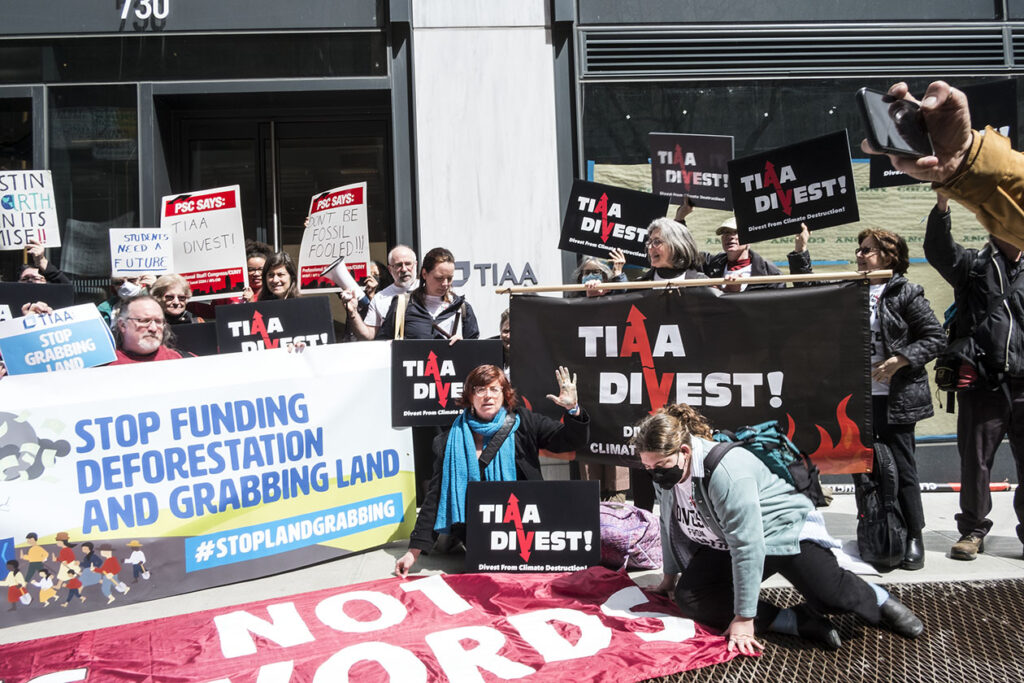
“It may be April Fool’s day, but TIAA can’t fool us,” said Iris Marie Bloom, co-organizer of the national TIAA Divest! campaign. “TIAA brands itself as an ‘ethical’ company while its fossil fuel investments are lethal and environmentally racist, fueling war, poisoning the air, water, soil, and destroying our climate. We demand full fossil fuel divestment by 2025!”
Over sixty people attended the multi-phased demonstration in Manhattan. First, nine activists wearing “TIAA Divest from Climate Chaos” and “Stop Land Grabs” t-shirts delivered the petition addressed to TIAA CEO Thasunda Brown Duckett, calling on the retirement giant to halt new investments in fossil fuels; fully divest from fossil fuels by 2025; and immediately stop TIAA’s acquisition of farm and timberland around the world, which is contributing to land grabs, deforestation, and environmental destruction, a major driver of the worsening climate crisis.
At noon, a striking piece of street theater symbolized TIAA’s toxic fossil fuel investments by pouring “oil” (a non-toxic water-based dark liquid, which activists mopped up afterwards in alignment with their care for the environment) on a
large world map.
Organizers said that TIAA has over $20 billion invested in fossil fuels, including Chevron, Exxon, Shell, Total, Enbridge, Adani, Formosa Plastics, and many more. They demanded that TIAA divest from the $174 million it has invested in Russian oil and gas majors Gazprom, Lukoil and Rosneft, to “stop bankrolling Russia’s war against Ukraine.”
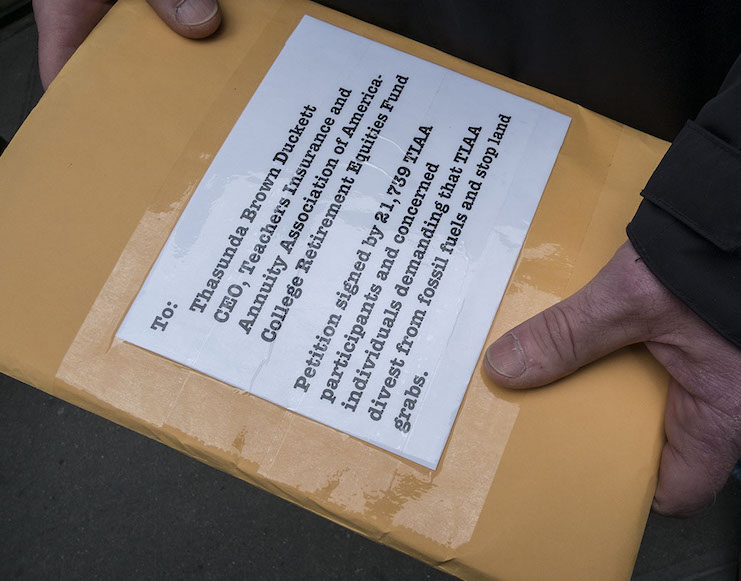
TIAA is one of the largest institutional investors of farmland and timberland in the world, with almost 3 million acres on 4 continents worth around $10 billion. However, TIAA has been accused of land grabbing in Brazil, and is even under investigation by the Brazilian government, and farmers in the US have accused TIAA of supporting
corporate farming and benefiting from the theft of farmland from Black and Indigenous people. Moreover, the company’s land is almost entirely in unsustainable, chemical-industrial agribusiness production.
A letter to TIAA sent by 113 organizations in September 2021 expressed dismay about the company’s climate plan, urged TIAA to divest fully from fossil fuels by 2025, and warned TIAA it must not rely on carbon offset false solutions that do nothing to limit emissions and perpetuate harms against frontline, Black, Brown, and Indigenous communities. The signers did not receive a response by TIAA or Ms. Brown Duckett, and so the TIAA-Divest and the Stop Land Grabs campaign joined forces for this week of actions to amplify those demands.
“In order to avoid catastrophic impacts of global climate change, scientists have indicated the world must cut emissions in half in less than 10 years. TIAA must do even more, and as a TIAA client myself, the company managing my savings can’t claim to be looking out for ‘my future’ when its investments destroy our collective future,” said Tristan Quinn-Thibodeau, Senior Policy Campaigner at ActionAid USA, an international development and human rights organization and client of TIAA.
Across the country, TIAA clients and stakeholders organized actions on April 1 at Pitzer College in Claremont, CA; at Cornell University in Ithaca, NY; at the University of Wisconsin-Madison in Madison, WI; and at the University of Pittsburgh in Pittsburgh, PA.
At Pitzer College, students and professors spoke out about the need for TIAA to immediately act to stop the climate crisis. At the University of Wisconsin-Madison, TIAA clients, farmers, and community members delivered a cake to the Chancellor of the University of Wisconsin, Rebbeca Blank, who is also on the Board of Governors of TIAA, to “thank” her for her time at TIAA, where she oversaw the company buy up farmland and continue its investments in harmful industries. At Cornell, students and faculty dressed as “fossil fools” in “oil barrels” with fools’ hats, and made fun of TIAA for repeating “fiduciary responsibility” while the world burns.
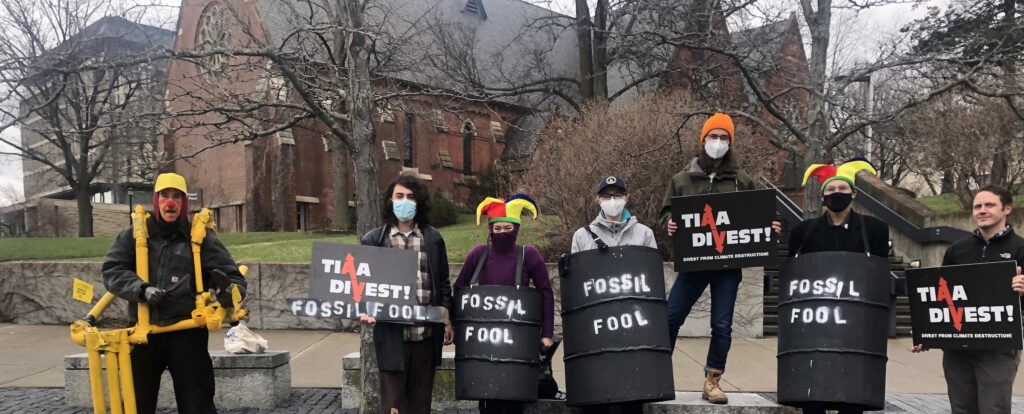
TIAA-Divest! and Stop Land Grabs campaigners are organizing actions at TIAA offices and college campuses across the country for the remainder of the week of April 4th including on April 7th in New Paltz, NY, and Baltimore, MD; and on April 8th in Washington, DC.
Organizations co-sponsoring the nationwide actions include: TIAA-Divest from Climate Destruction; Stop Land Grabs Coalition; ActionAid USA; Friends of the Earth U.S., Extinction Rebellion NYC; National Family Farm Coalition; Climate Safe Pensions Network; Presbyterian Hunger Program (Presbyterian Church USA); Uprooted and Rising; New Paltz Climate Action Coalition; Stand.Earth; Amazon Watch; Network for Social Justice and Human Rights, Brazil; Family Farm Defenders; Stop the Money Pipeline; and Grassroots International.
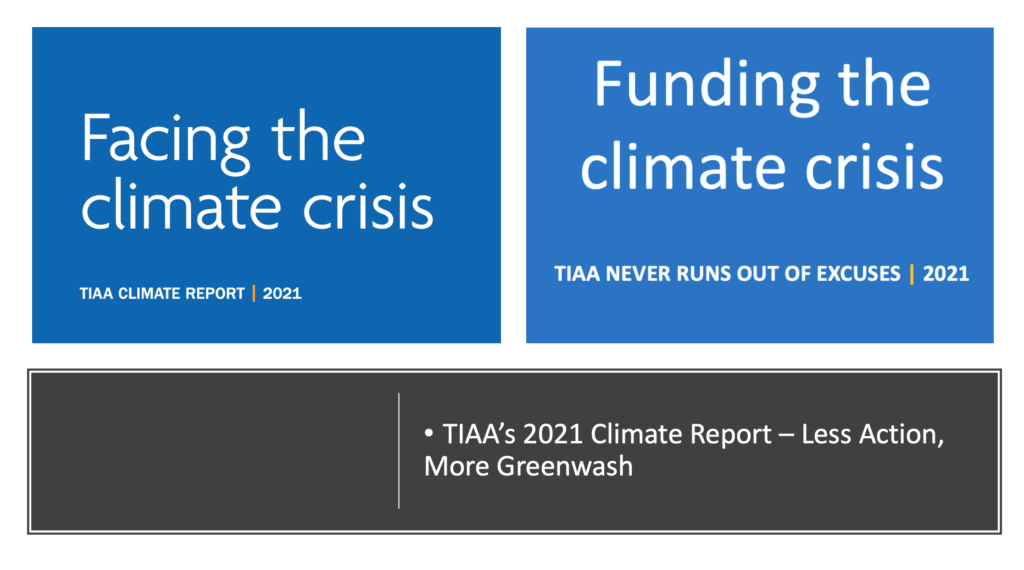
TIAA Releases 2021 Climate Report Doubling down on “Net zero by 2050” strategy and focusing on climate “risk” (to portfolio)
Jan. 1 2022 – TIAA has just released their first “Climate Report”, entitled “Facing the Climate Crisis”. The documents 22 landscape format pages includes a cover sheet, index page, a friendly message from the CEO, 7 infographics pages, a summary page with a photo of geese in flight and a disclaimer page. It does not include meaningful information about how TIAA intends to address their contributions to to the planet’s greenhouse gasses via investments in dozens of fossil fuel and petrochemical companies.
The report mentions fossil fuels only once, in the context of reducing the carbon footprint of TIAA’s real estate holdings. It decidedly does not mention halting or reversing TIAA’s ongoing investments in oil companies like Chevron, ConocoPhillips, Exxon Mobil and Adani Group.
Our analysis of the report indicated that TIAA shows no interest in stopping the harm that their continuing investments in fossil fuels causes. Their primary concern is reducing their financial risk from climate disasters. Once again TIAA is demonstrating that they will do almost anything to make a buck.
Read TIAA-Divest!’s response press release.
113 Groups Push TIAA to Divest from Fossil Fuels & Stop Land Grabs, Calling TIAA’s Net Zero by 2050 Plan “Wildly Inadequate” for the Climate Crisis
Sept. 28th 2021 – 113 climate justice, farm and food justice, human rights and environmental organizations joined TIAA-Divest! and the Stop Land Grabs Coalition to reject false climate solutions from TIAA, the $1.3T financial giant which manages retirement accounts for about 5 million clients and pension funds around the world. In a letter laying out 6 clear demands, the groups reject TIAA’s promise to achieve net zero carbon emissions by 2050 as “greenwashing” and push TIAA to fully divest from fossil fuels by 2025 and to immediately stop its acquisitions of farmland.
Read the full press release.
The groups call for TIAA to ban new fossil fuel investments, divest from all of its direct fossil fuel investments and high-emissions projects, and work with scientists and community stakeholders to create an investment plan that enables TIAA to stop land grabs and become a climate justice investor. TIAA is expected to release a more detailed plan on achieving “net zero” carbon emissions soon, and TIAA-Divest! fully expects that it will be based on utilizing TIAA’s tremendous land holdings as “carbon sinks”, converting wild lands to industrial tree plantations.
“By pledging to bring a fraction of its portfolios to net zero thirty years in the future, TIAA has joined the ‘burn now pay later’ club of low-ambition financial firms that choose to evade responsibility rather than phase out investments in fossil fuels as science, civil society, and economic logic demand,” said Jeff Conant, Senior International Forests Program Manager with Friends of the Earth. “Given TIAA’s role as a major investor in land and timber plantations, TIAA’s clients should be especially vigilant about how the firm chooses to invest in land-based carbon offsets in order to zero out its dirty investments. ‘Net zero’ is not zero, and TIAA is not acting responsibly when it comes to the climate emergency.”
Read the full letter to TIAA CEO Thasunda Brown Duckett and the list of signing organizations here.
TIAA/Nuveen SWITCH THEIR GREENWASH MACHINE TO HIGH-SPIN CYCLE
Email to SUNY participants claims “responsible investing” innovation.
State University of New York faculty and staff have been receiving emails from TIAA aimed at countering the wave of divestment resolutions passed by SUNY schools during the 2020/21 academic year. A heavy-handed attempt to paint TIAA’s investment strategy as being based in ESG principles, the message is easy to deconstruct if one has been following TIAA-Divest! news over the past year.
Please share our info-graphic below, in which we explain the realities behind TIAA’s greenwash.


TIAA ANNOUNCES 2050 CLIMATE TARGETS. IGNORES DIVESTMENT DEMANDS.
Executives espouse slow approach to climate “risk,” suggest planting trees.
In a press release dated May 12, 2021, TIAA announced that they intend to achieve “Net-Zero” carbon emissions in their General Account by 2050. This announcement is TIAA’s first public response to TIAA-Divest!’s divestment demands. The TIAA-Divest! team is formulating an in-depth response to TIAA’s proposals, and we are offering the following statement at this time:
TIAA is finally recognizing that it is essential for our common future to stop financing fossil fuels, but we are dismayed to see their proposed timeline, which is far too slow to stop the worst devastation predicted by climate scientists. Since the New York State pension fund has committed to full fossil fuel divestment in four years, we urge TIAA to follow their lead and pledge to divest by 2025, and to put an immediate end to land-grabbing deforestation. This rapid action will preserve countless homes, lives, and ecosystems.

SUNY Upstate Medical University Faculty take action on fossil fuel divestment
On Monday, May 17th the Upstate Medical University Faculty Senate took action pushing the $1.3T financial giant TIAA, which invests their pensions, to divest from fossil fuels and from deforestation investments due to the climate emergency. This makes Upstate Medical the first medical university to push TIAA to divest.
“TIAA is investing for our retirement by sacrificing our future,” commented Zac Bellinger, who shepherded the resolution from start to finish.
The momentum pressing TIAA to divest from fossil fuels and from deforestation investments is growing. Upstate Medical Faculty Senate is the 13th higher education body in New York State, representing at least 42,000 academic and professional faculty, to take action in just 6 months. SUNY is TIAA’s largest university client.
Last week, The New School University Senate and the University at Albany Faculty Senate both voted in favor of TIAA Divest Resolutions; the SUNY Chancellor, responding to pressure, is discussing meeting with SUNY professors pushing for divestment in June. Statewide SUNY bodies have passed TIAA Divest Resolutions. Twelve total have passed resolutions since SUNY New Paltz kicked off the high-intensity climate action campaign in December 2020, while one, SUNY Buffalo Faculty Senate, endorsed the statewide United Faculty Senate (UFS) resolution and will consider its own resolution at its next meeting.
TIAA has begun responding by offering “greenwashing” initiatives such as planting 1,000 trees; offering new investment products; and last week, Thasunda Brown Duckett, their new CEO, announced a brand-new commitment to go “net zero carbon by 2050.” We see thisas TIAA’s response to, and attempt to avoid, the increasingly thunderous demands for full fossil fuel and deforestation divestment.
Our campaign has already sent a letter to Thasunda Brown Duckett, and today we are responding today with a statement of our own:
“TIAA is finally recognizing that it is essential for our common future to stop financing fossil fuels, but we are dismayed to see their proposed timeline, which is far too slow to stop the worst devastation predicted by climate scientists. Since the New York State pension fund has committed to full fossil fuel divestment in four years, we urge TIAA to follow their lead and pledge to divest by 2025, and to put an immediate end to land-grabbing deforestation. This rapid action will preserve countless homes, lives, and ecosystems.”
Today, the International Energy Agency’s executive director called fossil fuels “junk investments,” making it clear that it’s time for shareholders of coal, oil and gas everywhere to read the writing on the wall and walk away from fossil fuels.

University at Albany Confronts TIAA on Climate
Twelfth Higher Ed Action Pushing TIAA to Divest from Fossil Fuels, Deforestation in New York State in 6 Months
13 May, 2021, Albany, NY– The fossil fuel divestment movement is on fire. Yet another State University of New York (SUNY) campus, the University at Albany’s University Senate, voted yesterday by a wide margin to pass a resolution pushing the $1.3T financial giant TIAA to divest from fossil fuels, while also confronting TIAA about its Brazilian landholdings which have been going up in smoke. Deforestation is the second largest driver of climate change, after fossil fuels.
Albany’s University Senate, which represents academic and professional faculty, is the 11th higher education body in New York State to pass a resolution (and the 12th to take action) urging TIAA to divest from climate destruction resolution since December 2020. SUNY is TIAA’s largest university client.
Ron Friedman, Associate Professor of Psychology, shepherded the Resolution through its passage. Friedman praised the action, “In passing this resolution calling upon TIAA to divest its fossil fuel holdings, the academic and professional faculty of UAlbany took a strong stand on behalf of environmental justice and sustainability.”
Friedman, who received UAlbany’s Terra Award for his work on climate, added that “Climate change is as much a psychological issue as a matter of climate science because the crisis is a result of human activity and must be resolved by changing people’s behavior.”
The statewide University Faculty Senate resolution passed on April 24th, 2021, following and supporting TIAA Divest Resolutions, which urge TIAA to divest from fossil fuels and from land grabs associated with deforestation and human rights abuses, at SUNY New Paltz, SUNY New Paltz UUP chapter, SUNY Cortland, the statewide United University Professionals (the largest higher education union in the U.S.), SUNY Geneseo, SUNY Stony Brook; the CUNY PSC union, and Cornell University.
The New School, based in New York City, passed a resolution two days ago, on May 11th, pushing TIAA to divest from fossil fuels and from land grabs associated with deforestation and environmental harms.
The momentum’s strength has gotten the attention of SUNY Chancellor Jim Malatras. “This campaign’s acceleration has been extraordinary,” commented Alex Crawford, a SUNY New Paltz student leader, “in keeping with the extraordinary challenges of the climate emergency.” The TIAA Divest campaign’s winning streak began with the SUNY New Paltz Faculty Senate’s “YES” vote for TIAA divestment in December 2020.
According to The New School’s TIAA Divest Resolution, “TIAA currently has 10 billion dollars invested in industries promoting fossil fuel production, distribution and consumption… Additionally, TIAA has invested heavily in deforestation including $641 million invested… agribusiness companies associated with deforestation, land grabbing, labor abuses, human rights violations, and severe climate impacts… and has expanded agriculture in the threatened ecosystem of the Brazilian Cerrado, contributing to deforestation, water contamination, and human rights violations against local communities.”
Shell Game
TIAA appears to be showing signs of responding to the calls for divestment from both fossil fuels and from deforestation, by making what organizers call “token gestures designed to distract from the demand to divest.” TIAA is providing funding to plant 1,000 trees and refers to this as “fighting deforestation,” while deforestation on TIAA-owned land continues in Brazil’s sensitive Cerrado region. TIAA owns so much land through “shell companies” that a Brazilian government agency, INCRA, has declared TIAA’s landholdings to be illegal (Bloomberg, “U.S. Pension Fund TIAA Embroiled in Brazil Land-Buying Probe,” farmlandgrab.org, “TIAA’s farmland funds linked to fires.”)
TIAA is also hosting webinars for SUNY faculty this week to promote “sustainable” investment products, without addressing demands for rapid fossil fuel divestment. Due to climate tipping points, scientists say 2030 is the new 2050 in terms of climate solutions. Fossil fuel industry rates of return are plummeting.
“We are happy to support ESG investing, but not as a substitute for real divestment,” said Bill Kish, a campaign coordinator working with TIAA-Divest! “We are helping to amplify the voices of over 42,000 faculty and staff who have already voted to direct TIAA to divest from climate destruction, period.”
A current glance at the assessment of TIAA funds rated on Fossil Free Funds (dot) org shows that 5 TIAA funds, representing a total of over $30B in investments, are rated “C,” two funds are rated “D,” and only 3 of their smaller funds – each representing less than $1B in investments – are rated “B” or “A.”
As the global movement for fossil fuel divestment passes the $15T mark, while the climate emergency is increasingly lethal due to floods, fires, extreme storms, desertification and coral bleaching, the TIAA-Divest! campaign is “not going to stop until we win,” says Kish.
New School Faculty Confront TIAA Over Climate-Harming Investments, Land Grabs; Urge Divestment

Heather Davis: “We are horrified that TIAA is using our pensions to support climate destruction and environmental injustice”
New York, NY– On Tuesday May 11th, The New School Faculty Senate became the 11th higher education body in New York State to pass a Resolution urging the financial giant TIAA to divest from fossil fuels, and from destructive land grabs associated with deforestation and human rights abuses. Beginning with SUNY New Paltz in December 2020, moving on to 8 campuses and the United University Professions, which represents over 42,000 faculty members, the TIAA-Divest! campaign has been on a winning streak which includes Cornell University, the CUNY union, recently SUNY Buffalo, and the statewide University Faculty Senate, all pressing for TIAA to “divest from climate destruction.”

Heather Davis, Assistant Professor of Culture and Media at The New School, first presented the Resolution to the Faculty Senate in February 2021. Davis commented, “We are horrified that TIAA is using our pensions to support climate destruction and environmental injustice, and so we are demanding, with this resolution, that TIAA immediately divest from its fossil fuel investments and damaging land grab practices.”
The New School Faculty Senate Resolution says, in part: “A recent report, published in Environmental Research, shows that fossil fuels caused 8.7 million deaths in 2018, disproportionately affecting black, brown, indigenous and poorer communities. Scientists agree that the burning of fossil fuels has raised global temperatures by an average of 1.1C (2F) since pre-industrial levels, which, if left unchecked, would flood coastal areas, displacing and destroying lives all across the globe.
“We are happy to support ESG investing, but not as a substitute for real divestment,” said Bill Kish, a campaign coordinator working with TIAA-Divest! “Greenwashing by any other name distracts the same. But we are helping to amplify the voices of over 42,000 faculty and staff who have already voted to direct TIAA to divest from climate destruction, period.” https://tiaa-divest.org/

Stony Brook University Faculty Push TIAA to Divest from Fossil Fuels, Stop Land Grabs
On Monday, April 5th, The State University of New York at Stony Brook (Stony Brook University) Faculty Senate passed a resolution urging TIAA to divest from fossil fuels and to implement a no-deforestation policy, which would stop land-grabs that harm indigenous communities and climate. Stony Brook’s is the 8th such resolution passed, and the 4th resolution passed by a SUNY campus, since December 2020. These actions add power to the fossil fuel divestment movement’s momentum.
“Stony Brook University’s faculty now adds their vital voice to a growing crescendo of faculty members, along with staff and students, who don’t want to see their TIAA-managed pensions funding the very institutions actively destroying the climate and committing environmental racism right now,” said Iris Marie Bloom, an organizer with TIAA Divest from Climate Destruction. “We are delighted with the work done by Justin Johnston at SUNY Stony Brook, as well as with those who passed 7 previous resolutions at multiple campuses.”
The timing is urgent. This past weekend, the concentration of carbon dioxide in the atmosphere surpassed 420 parts per million for the first time in recorded history. The measurement puts the planet roughly at the halfway point on the path to doubling pre-industrial CO2 levels. The reading was taken at the Mauna Loa Observatory in Hawaii.
Cornell University Assembly calls for TIAA Divestment

On March 16th the Cornell University Assembly passed a Resolution calling on TIAA to divest from fossil fuels and from land-grabs which harm indigenous peoples and lead to deforestation.
This is the first TIAA Divest Resolution passed outside the SUNY system, and the fifth overall. This victory is due to extraordinary leadership by Dr. Caroline Levine, the Faculty Representative who sponsored the Resolution.
In the news: An article covering the TIAA Divest from Climate Destruction campaign’s origins, goals, and early victories, hit the press yesterday, before the victory at Cornell was known. Hat tip to Brian Obach of SUNY New Paltz and to Arvind Dilawar, independent journalist at The River: SUNY Faculty Urge TIAA to Divest from Fossil Fuels
Environmental Racism and TIAA: TIAA is invested in Enbridge, which is building Line 3; in Valero, which is pushing the Byhalia Pipeline through Black low-wealth communities in Memphis who are putting up a fight for their land and drinking water; in Adani, which plans to destroy unceded Aboriginal lands to build a notorious mega coal mine in Australia; in Chevron, which has devastated and refused to clean up its lethal oil mess in Ecuadorian Amazon.
Need we go on? Not right now. But we do need your help so please share news of this campaign widely: with journalists; on social media; and with faculty at institutions of higher education across the U.S.
To contact the campaign: contact@tiaa-divest.org
Please follow/like TIAA Divest on Facebook
On Twitter, please search / use hashtag #TIAADivest
For Immediate Release: February 25th, 2021
Contact:
- Bill Kish (914) 441-4414 / kish@browncow.com
- Alexandra Crawford (917) 513-1343 / acrawford589@gmail.com
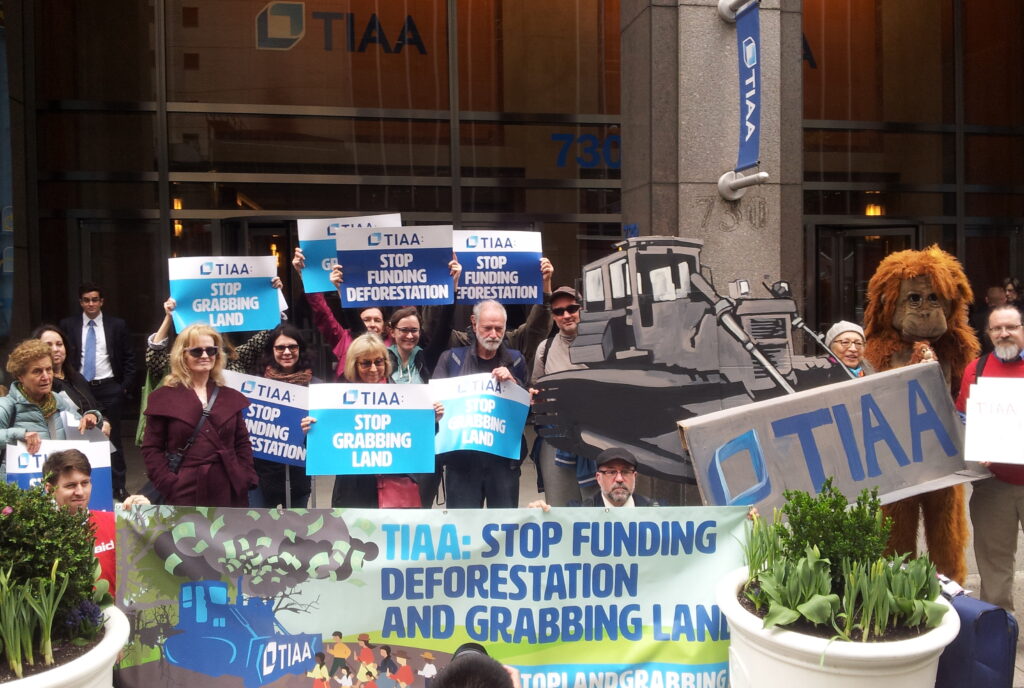
Climate Matters: SUNY Cortland Faculty Senate Pushes TIAA to Divest
Passes resolution urging TIAA to divest from fossil fuels and deforestation risk holdings
Cortland, NY – The State University of New York (SUNY) Cortland Faculty Senate unanimously passed a resolution on Tuesday February 23rd urging financial giant TIAA, which manages SUNY faculty pension fund investments, to divest from fossil fuels and to implement a no- deforestation policy. Two members of the SUNY Cortland faculty, Ross Borden and Chris Badurek, submitted the resolution to the SUNY Cortland Faculty Senate. The statewide SUNY system is TIAA’s largest university client.
Meanwhile, stunning new data released today by Urgewald and 28 NGO partners shows TIAA to be the 8th largest investor in the coal industry in the U.S.[1] TIAA has at least $7.43B invested in fossil fuel companies,[2] according to Fossil Free Funds, and $477M in agribusiness companies involved in land grabs, human rights violations, and deforestation.[3]
Environmental sustainability geographer Chris Badurek, a professor and Faculty Senate member at SUNY Cortland, commented, “The SUNY Cortland Faculty Senate voted in support of directly addressing the climate crisis. There is no more pressing crisis than the climate crisis. As a higher education institution we are compelled to lead by making transformative changes to our energy economy. SUNY Cortland has made an investment in energy efficiency and in renewable energy sources and today’s resolution further extends this sustainability leadership.”[4]
Ross Borden, a lecturer in English at SUNY Cortland, commented, “The faculty of SUNY Cortland is excited to join TIAA Divest! at this crucial moment. We earnestly hope that together with United University Professions (UUP) and other SUNY campuses, we can influence TIAA to choose a new CEO who will commit to a clean environment and a sustainable future.” Roger Ferguson, TIAA’s current CEO, announced he will step down at the end of March.
Deforestation is the second leading cause of climate change, after the burning of fossil fuels, so TIAA’s land-grabs are confronted as well. In Brazil, where TIAA is one of the two largest foreign buyers of land, TIAA land-grabs have thrown traditional communities off their lands. Large tracts of TIAA-owned land in Brazil have gone up in smoke.[5]
The Cortland resolution is the fourth TIAA Divest resolution passed by bodies within the SUNY system in ten weeks. In December, the SUNY New Paltz Faculty Senate and the SUNY New Paltz UUP union chapter passed a resolution that urged TIAA to divest from fossil fuels and to end its harmful deforestation investments. The statewide UUP, which represents faculty and professional staff at all 64 SUNY campuses, passed its resolution in January. It is the largest higher education union in the U.S.
SUNY Cortland has a solar installation on campus. Since Fall 2013, SUNY Cortland has operated all its facilities – residence halls, dining areas, sports facilities, everything – using 100 percent renewable electrical energy. SUNY Cortland was the first SUNY campus to do so.
In meetings with the TIAA Divest! campaign in 2020, TIAA “remained intransigent, refused to consider implementing a moratorium on new fossil fuel investments or to divest current fossil fuel investments, and failed to reconsider their deforestation investments in Brazil,” commented Bill Kish, a volunteer organizer with the TIAA Divest! campaign. Kish lives near the polluting Cricket Valley Energy fracked gas power plant, which is partially owned by TIAA.[6]
“In a time when nearly 1 in 5 premature deaths globally are caused by fossil fuel-related air pollution,[7] it is imperative to prevent further lives from being harmed by the fossil fuel industry,” commented Alexandra Crawford, a student leader at SUNY New Paltz. “As a young person, I urge more university campuses to push TIAA to divest. It’s a matter of climate justice.”
TIAA manages retirement funds for workers in academic, cultural, medical, and other non-profit fields. Beyond SUNY, campuses nationwide are showing an interest in the campaign, including participants from Harvard University, University of North Carolina, New York University, University of Montana, Montana State University, Vassar College, and others.
[1] Banks & Investors behind the Global Coal Plant Pipeline
Published February 25th, 2021
https://coalexit.org/finance-data
[2] TIAA/Nuveen: 7.43 Billion in Fossil Fuel Investments
https://fossilfreefunds.org/families?q=TIAA%20Investments%2FNuveen
[3] How TIAA/Nuveen is Invested in the Climate Crisis
https://deforestationfreefunds.org/families?q=TIAA%20Investments%2FNuveen
[4] College Commits to Renewable Electricity
https://www2.cortland.edu/news/detail.dot?id=0a9596c7-7aad-418f-8ee2-33e290ddf29d
[5] TIAA and Harvard’s Brazilian farm deals judged illegal
https://grain.org/en/article/6588-tiaa-and-harvard-s-brazilian-farm-deals-judged-illegal
[6] Five Things Organizers Should Know About the Cricket Valley Fracked Gas Plant
[7] Deaths from fossil fuel emissions higher than previously thought
For Immediate Release: January 27, 2021
Contact:
- Alexandra Crawford (917) 513-1343 / acrawford589@gmail.com
- Brian Obach (845) 943-9617 / brianobach@gmail.com

Nation’s Largest Higher Education Union Pushes TIAA to Divest from Fossil Fuels, Deforestation
“The fight for our common future cannot be delayed”: UUP Union President
NEW YORK – The largest higher education union in the U.S., the United University Professions (UUP), passed a resolution on January 23rd pressing TIAA to divest from fossil fuels and deforestation-risk investments, which worsen climate change. UUP is the union representing faculty and staff across the State University of New York (SUNY) higher education system. TIAA, the giant financial services company, manages retirement funds for most SUNY faculty and staff. In December, both the SUNY New Paltz Faculty Senate and the SUNY New Paltz UUP Chapter passed resolutions urging TIAA to stop funding climate destruction, amidst an increasingly powerful fossil fuel divestment movement.
Fred Kowal, the statewide UUP President, commented, “UUP has taken the absolutely necessary step of calling for TIAA to divest from those companies engaged in exploiting energy sources that are exacerbating the serious climate crisis we’re facing. We are honored to stand with those on the frontlines fighting for true environmental justice. The fight for our common future cannot be delayed or fought with half-way measures. Divestment is an urgent and necessary step.”
Brian Obach, Sociology Professor at SUNY New Paltz, added, “I am so proud that UUP has taken a strong stance in favor of fossil fuel divestment. As a SUNY faculty member with retirement funds managed by TIAA, I am disgusted by the fact that my money is advancing climate change, deforestation, and human rights abuses.”
The resolution condemns TIAA’s $8 billion in investments which harm climate and communities. TIAA has invested $477 million in agribusiness holdings which contribute to deforestation, indigenous rights violations, and environmental degradation[1]. TIAA has invested $7 billion in the fossil fuel industry[2]. UUP’s resolution calls on the SUNY Board of Trustees to “advocate for the divestment of TIAA funds from all fossil fuel holdings,” and to push to end TIAA landholdings “associated with deforestation and human rights abuses.” A Brazilian agency is now challenging TIAA’s land grabs in Brazil[3] as illegal[4], adding further punch to the divestment push.
Ross Borden, a lecturer in English at SUNY Cortland and a member of the SUNY Cortland Faculty Senate, looks to the future: “It’s wonderful news that UUP has joined the TIAA-Divest campaign. Here’s hoping every SUNY campus will soon join the campaign, following the example of New Paltz and building momentum for public and private universities across the U.S. to divest from catastrophic environmental harms.”
“As a young person, I believe it is vital that we hold financial companies such as TIAA accountable. This resolution is another step towards halting the harm that these investments can have on the environment and on our own communities,” comments Alexandra Crawford, an undergraduate student at SUNY New Paltz.
[1] “How TIAA/Nuveen is Invested in the Climate Crisis” https://deforestationfreefunds.org/families?q=TIAA%20Investments%2FNuveen
[2] ibid
[3] “Harvard and TIAA’s Land Goes Up in Smoke” https://www.grain.org/en/article/6339-harvard-and-tiaa-s-farmland-grab-in-brazil-goes-up-in-smoke
[4] “U.S. Pension Fund TIAA Embroiled in Brazil Land Purchase Probe” https://www.bloomberg.com/news/articles/2020-12-17/u-s-pension-fund-tiaa-embroiled-in-brazil-land-purchase-probe
FOR IMMEDIATE RELEASE: December 7th, 2020
Contact:
- Brian Obach (845) 943-9617 / brianobach@gmail.com
- Scott Minkoff (301) 806-0267 / sminkoff@gmail.com
- Caroline Levine 608-215-0485 / provokingdemocracy@gmail.com
- Iris Marie Bloom (215) 840-6489 / protectingourwaters@gmail.com

SUNY New Paltz Faculty Senate Pushes TIAA to Halt Climate-Harming Investments
Passes Resolution urging TIAA to divest from fossil fuels and deforestation risk
Part of larger push to divest billions from climate destruction
NEW PALTZ, NY – On Wednesday, December 2nd, the SUNY New Paltz Faculty Senate passed an historic university faculty resolution pushing financial giant TIAA to divest from fossil fuels and from deforestation-risk investments. The faculty’s union chapter also passed a similar resolution on December 3rd. The measures are part of a growing effort to pressure pension funds and other financial institutions to end support for the fossil fuel industry. Two SUNY New Paltz faculty members, Brian Obach and Scott Minkoff, co-wrote the resolutions.
“How can we be against climate change while at the same time be sponsoring the fossil fuel industry through our retirement funds?” asked Brian Obach, SUNY New Paltz Professor of Sociology. “The New Paltz faculty have spoken: we want TIAA to take our money out of the climate change industry.”
The resolutions build on remarkable advances in fossil fuel divestment worldwide. Forty-seven more religious institutions just committed to full fossil fuel divestment, bringing the total number of religious institutions committed to divestment to about 400. The Bank of America also became the last major bank to withdraw funding for Arctic drilling, as concern about the climate emergency continues to grow.
Scott Minkoff, the SUNY New Paltz faculty member who introduced the resolution to the Faculty Senate, commented, “SUNY has more than 40,000 academic and professional faculty across 29 campuses. Many of those people are invested with TIAA, and we hope that campus leaders across the state will join us in advocating for divestment from fossil fuel holdings and agribusiness companies associated with deforestation and human rights abuses. Collectively, we can really make a difference.” Minkoff is Associate Professor in the Department of Political Science and International Relations.
The New Paltz community first learned about TIAA’s fossil fuel investments, estimated at $8.5 billion, when members of New Paltz Climate Action Coalition got arrested last November during a nonviolent climate action organized by ResistCVE. They shut down construction, for one day, of the largest fracked gas electric power plant in the Northeast, the Cricket Valley Energy Center (CVEC) in Dutchess County, only to learn that TIAA is a major owner of CVEC.
“Imagine our surprise when, despite the clean green image of TIAA, we found out they were directly responsible for building CVEC, the fracked gas power plant which is already harming residents’ health in a vulnerable, rural and largely low-income community, while putting one of the East Coast’s largest freshwater wetlands in harm’s way from toxic pollutants,” commented Iris Marie Bloom, Director of Protecting Our Waters and a co-organizer of TIAA Divest! “We took a deeper look and found that TIAA remains deeply committed to fossil fuel investments, and to landholdings in Brazil which are associated with deforestation, human rights violations and displacement of indigenous communities. So we initiated a “TIAA Divest from Climate Destruction!” campaign right away.” The campaign posts information and breaking news at tiaa-divest.org.
That campaign now extends to multiple campuses, including Bard, Columbia, Cornell, Harvard, The New School, and UNC-Asheville, among others. Caroline Levine, Ryan Professor of the Humanities at Cornell University, affirmed, “The SUNY New Paltz faculty is already inspiring other campuses to ask questions about TIAA’s continuing investments in fossil fuels and deforestation. We are planning to follow their lead at Cornell. Their resolution should wake us all up to TIAA’s investments in climate catastrophe.”
The SUNY New Paltz resolutions act as a nonviolent shot across the bow of TIAA, which is actively searching for a new CEO to replace Roger Ferguson when he steps down in March. The TIAA Divest! campaign “strongly encourages TIAA to pick a CEO who will guide them through the process of divestment from fossil fuel holdings and deforestation risk investments, which are unjust, harm climate, and reduce the likelihood of human survival.”
“As we watch this disaster unfold,” Brian Obach concluded, “we may find ourselves asking the same question asked by those who have borne witness to injustice and disaster throughout history, ‘could I have done more to stop this?’ There is good reason to do more; there is no basis for doing less.”
NOTES:
Brian Obach and Scott Minkoff are speaking as individuals with titles included for identification purposes only. Their views are not intended to represent those of SUNY New Paltz or the larger SUNY system.
The SUNY New Paltz Faculty Senate is the representative governance body of the SUNY New Paltz academic and professional faculty. It passed the resolution on December 2nd, 2020. The SUNY New Paltz chapter of the Union of University Professionals (UUP), an American Federation of Teachers (AFT) affiliate, passed their resolution on December 3rd, 2020.
● “‘Huge News’: Nearly Four Dozen Faith Institutions Announce Divestment from Fossil Fuels” 11/16/2020 Common Dreamshttps://www.commondreams.org/news/2020/11/16/huge-news-nearly-four-dozen-faith-institutions-announce-divestment-fossil-fuels
● “Bank of America Latest to Say No To Arctic Drilling” 11/30/2020 Barrons https://www.barrons.com/news/bank-of-america-latest-to-say-no-to-financing-arctic-drilling-01606783806
● Rainforest Action Network slams TIAA’s nonexistent fossil fuel investment policy https://insurance-scorecard.com/view/?Value=tiaa&password
December 1st, 2020 – Roger Ferguson to step down as TIAA CEO, may join Biden administration.
On November 17th, TIAA’s President and CEO Roger Ferguson announced him upcoming retirement, effective March 31st, 2021.
As the individual at the top the TIAA-Nuveen management pyramid, we at TIAA-DIVEST! have been focusing our messaging directly at Roger Ferguson. We have no doubt that whoever is sitting in the CEO seat at TIAA has the power to change TIAA’s investment strategy towards climate and social justice. Ferguson is on his way out, possibly to lead the Biden administration’s National Economic Council, so we will need to recalibrate.
Now that TIAA-Divest’s organizers have had the opportunity to digest the news and to strategize, we realize that this change is a tremendous opportunity. There will be a new captain at TIAA’s helm, and we want TIAA to hire a leader who understands that TIAA’s tremendous economic power needs to be handled responsibly.
TIAA’s beneficiaries (That’s YOU if you have a TIAA retirement account) need to demand that TIAA hires a new CEO who can pull them out of their current fossil fueled, deforestation powered, 19th century mindset and who understands that TIAA can’t meet it’s client’s needs unless it:
- Immediately stops new investments in fossil fuel production, processing and infrastructure.
- Publishes a detailed investment policy describing how TIAA will extract itself from deforestation risk lands, land grabbing and industrial scale agribusiness that forces independent farmers off their land and steals the homes of indigenous peoples.
- Immediately stops fighting New York’s clean energy policies. And immediately sells its Cricket Valley Energy Center fracked gas power plant. (TIAA claims they can’t find a buyer, but TIAA-DIVEST maintains an open offer to buy the plant in order to shut it down!)
This is the chance for you to do something! Please take 5 minutes to let TIAA know that their next CEO needs to be a true visionary who’ll take TIAA’s billions of dollars out of the extraction economy and use it to power a new clean, just and responsible retirement system that won’t bleed their clients savings into oil industry’s losing holes in the ground.